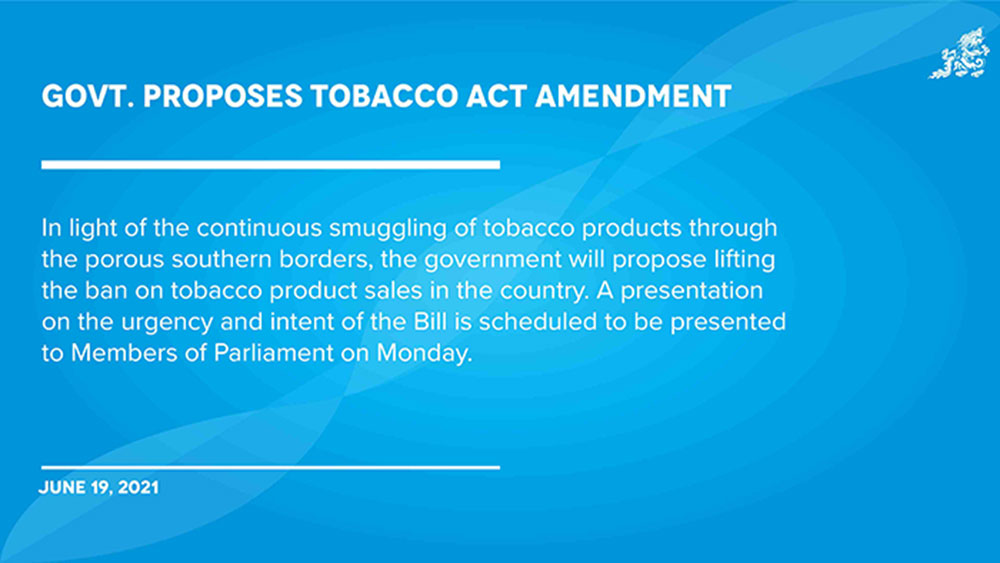MB Subba
The government will propose lifting the ban on the sale of tobacco products in the country through the amendment of the Tobacco Act as an urgent Bill in the ongoing session of Parliament.
Officials familiar with the amendment proposal said that it was being proposed in view of the continued smuggling of tobacco products through the porous border in the south, which has been identified as one of the main reasons for the spread of the Covid-19 virus in the country.
Kuensel learnt that the National Assembly secretariat has received the amendment proposal from the government as an urgent Bill. The government is scheduled to make a presentation on the urgency and intent of the Bill to Members of Parliament on Monday.
Speaker Wangchuk Namgyel said that the due process would takes its course once the government makes the plenary on Monday. The details of the Bill were not shared.
According to the Legislative Rules of Procedure (LRoP), the Speaker should consult with the National Council Chairperson on urgent Bills, which are passed in the same session.
Parliament will have joint sessions from Monday and the closing ceremony is scheduled for June 30. However, according to officials, the two Houses could have sessions separately in between the joint sessions, as an urgent Bill cannot be introduced in a joint session.
Initially, the amendment of the Tobacco Act was not included in the agenda of the summer session.
Opposition Leader Dorji Wangdi said, “We are waiting for a formal briefing from the government on the matter. It will depend on the gravity of the situation, and if the situation demands, we should collectively find appropriate solutions”.
The current Act was enacted during the first government’s tenure and it has been amended a few times since. The government allowed the Bhutan Duty-Free Limited (BDFL) to sell tobacco products last year amid questions about its legality.
However, allowing the BDFL to sell tobacco did not stop the smuggling of tobacco products into the country. Sources said that tobacco products were smuggled both through the mini Phuentsholing dry port as well as the porous border in the south.
From the closure of the border on March 23 last year to June 12 this year, a total of 132 persons (109 in 2020 and 23 in 2021) were arrested in connection with the smuggling of tobacco products, according to a source. A total of 144 incidents of tobacco smuggling cases were reported during the same period, of which 58 were from Phuentsholing, 39 from Samtse, 38 from Gelephu and nine from Samdrupjongkhar.
The trend shows that the amount of tobacco seized increased drastically in 2020 and 2021.
The value of various tobacco products seized in 2018 and 2019 was Nu 4.769 million (M) at the maximum retail price (MRP). The value of the seized tobacco in 2020 and the first five and a half months of 2021 increased drastically to Nu 13.045M at MRP. With a 100 percent tax, the amount would double to Nu 35.629M.
Officials said that it was difficult for the BDFL to supply tobacco products in remote pockets of the country.
In September last year, the seven gups of Khebisa, Tsangkha, Karna, Tsendagang, Drujeygang, Dorona and Tseza gewogs in Dagana had refused to distribute the tobacco products, saying that tobacco consumers outnumbered the stock they received and that they also wanted to help people quit the habit of consuming tobacco.
Border dzongkhags, including Chhukha, Samtse and Samdrupjongkhar have recently reported community transmission of Covid-19 despite the close monitoring of the border.
Legal questions also remain about the government’s decision to allow the Duty-Free to sell tobacco products.
The People’s Democratic Party (PDP) had challenged the government’s decision to open tobacco outlets in the country managed by the BDFL. Accusing the government of transgressing clauses of the Tobacco Control Act 2010, the party questioned the legality of the decision that allowed the sale of tobacco through tobacco outlets in the country.
However, the Office of Attorney General then stated that the government had not breached the Tobacco Control Act.


